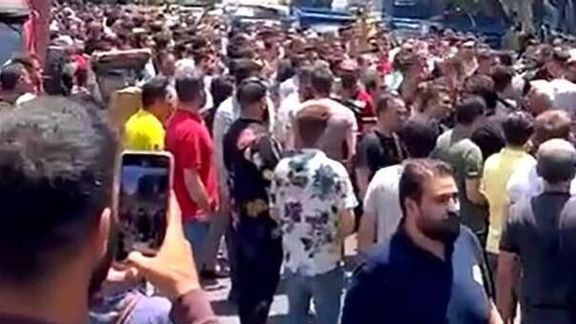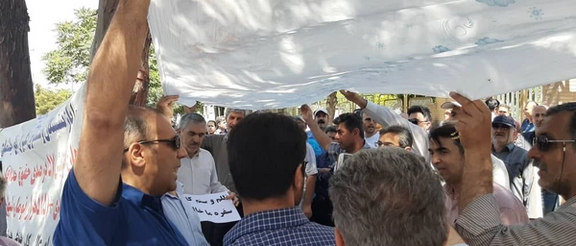Criticism Of Iran Government Intensifies As Protests Spread To Tehran

As protests in Iran spread to Tehran on Sunday and continued on Monday, criticism of the government's economic and foreign policies intensified in the media.

As protests in Iran spread to Tehran on Sunday and continued on Monday, criticism of the government's economic and foreign policies intensified in the media.
Mehdi Pazouki, one of the Iranian economists who had warned President Ebrahim Raisi on Saturday that the underlying cause of the ongoing crisis is bad governance, and warned Raisi to introduce deep changes or wait for further chaos, said in an interview with Didban Iran website that his administration is the weakest government in Iran's history.
Pazouki criticized Raisi for forming a government by choosing his ministers and aides from among the members of a certain clan, such as appointing a politician [Ali Bagheri Kani] as Iran's chief nuclear negotiator who has always been against a nuclear agreement with the West. He also argued that Raisi has no economic program for the country although he had claimed during his election campaign to have a 7,000-page plan.
Like many other critics, Pazouki also maintained that Raisi's cabinet continues to blame the previous government for the country's problems to cover up its own inefficiency. Mentioning examples from the performance of Labor Minister Hojjat Abdolmaleki, Pazouki said that the minister's counter-productive performance in the area of wages and pensions has led to more unemployment and dissent.
Giving key jobs to non-experts, failing to prevent the effective devaluation of the national currency, being unable to do anything about rising food prices and wasting hefty budgets on “useless organizations” such as The Supreme Council of Cultural Revolution are among the other negative points of the Raisi administration, Pazouki added.

Meanwhile, former vice president Mostafa Hashemi Taba told reporters that the country's situation is getting worse on a daily basis, adding that it was evident from day one that Raisi was not able to stand by the promises he made during his election campaign. Hashemi Taba further said, that those promises were so extravagant that not only Raisi, but no other president could have accomplished them.
Meanwhile, interviews with fuel distribution officials indicated that there is a growing concern among consumers about an imminent rise in fuel prices. Some media in Iran have revealed that customers' gas rationing cards are being recalled and collected at some gas stations and this has given further rise to concerns about possible new rations and new prices. Although officials have tried to deny the rumors, Iranians generally believe based on previous experience that whatever officials deny today will come out to be true the next day.
Reformist political analyst Ahmad Naqibzadeh told Didban Iran that it appears officials are adamant to continue policies that have proven to be ineffective in the past. He added that they are not even willing to correct their wrong policies and call their critics the enemies of the state.
Criticism of Raisi's foreign policy is mainly about his government's failure to successfully carry out the nuclear negotiations in Vienna. Iranian lawmaker Zabihollah Azami said in an interview with Rouydad24 website on Sunday that the government should be held accountable for the opportunities it missed in the Vienna negotiations.
Iranian businesses and economists hoped that the negotiations would lead to the lifting of US sanctions and improving the battered economy, but critics now say the government's mistakes have led to the suspension of the talks since March.